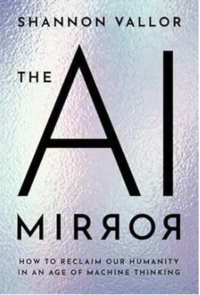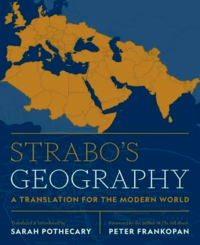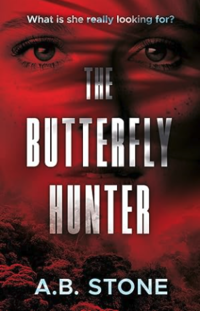OFF THE SHELF: AUGUST 2024

OFF THE SHELF: AUGUST 2024
Artificial Intelligence, ancient world geography, Nazi hunting and a Chinese Jesuit emigre
Published: 19 August 2024
Richard Lofthouse
Share this article

AI Morality, ed. David Edmonds (Oxford University Press, August 2024)
The AI Mirror by Shannon Vallor (Oxford University Press, June 2024)
It makes sense to review this brace of books together, because both are important, both deserve to do well and both are proof that the machines are not in charge yet. They also highlight how Oxford has forged itself as a beacon of commonsense and leadership amidst much current absurdity and hype regarding Artificial Intelligence.
First the newest book, which is a tour de force of 20 leading Oxford-linked authors, brought together in a masterful editorship by David Edmonds, whose Philosophy Bites podcasts have been very popular. He is currently a Distinguished Research Fellow at Oxford’s Uehiro Centre for Practical Ethics. Oxford also boasts the Institute for Ethics in AI, led by John Tasioulas, also present here as an author. Both centres are richly represented here in a series of 20 essays concisely addressing urgent issues where AI could be useful but also disastrous, beginning with ‘Autonomous Weapons Systems and Human Rights’ by Linda Eggert of Balliol College. Her commentary broadly speaks for the whole conundrum in miniature, namely that the good thing about an algorithm is that it doesn’t act out of rage or spite. Put it behind a weapon and war crimes will dwindle, hooray! The bad thing about the algorithm is the same one, it has no heart or empathy or morality, so frankly it might kill you and when it does there’s literally no one to blame because it wasn’t a person who took the decision (potentially). No wonder this stuff is filling the sails of so many academics and philosophers in the fields of human rights, legal and moral philosophy and their many subsets (consequentialism in ethics, to name one). The whole volume doesn’t exceed 240 pages and is a bootcamp for everyone in all fields and walks of life, from insurance to art. Divided into four parts it covers defence health, law; politics and governance; work and play; manipulation, autonomy and algorithms, and finally identity and values. Encouragingly, although I don’t think it is necessarily what readers are meant to take from it, the final chapter about aligning machine values with human values by Oxford’s Professor of Jurisprudence Ruth Chang, might be seen as reiterating the human condition as completely unchanged. That is to say, if you can list as many reasons to have kids as not to have kids, or live in the countryside or live in a city, no machine learning is going to make that decision for you. Conceivably, however, AI could inform your choice through massive data inputs and everyone seems to agree that the healthcare/medicine sector will be a strong area of application where good outweighs bad...

...In this sense Shannon Vallor’s book is an essential companion. Vallor is not at Oxford but a professor at Edinburgh, and perhaps of more note a former AI Ethicist at Google. Her book is a work of human art and reads like poetry in places, not the slightest bit what you might be expecting. Writ large is the same problem we find everywhere with the algos: if we capitulate our agency to them society might collapse amid disinformation spread thickly and deliberately by the tech bros, grotesque inequality, accelerated climate change, global warfare. That’s because the algorithm is like a mirror, only distorted by data that lies in the past, and many of its actors prefer words like ‘innovation’ to ‘progress’ because progress implies the measurable good, whereas innovation could mean poisoning everyone, as long as how you do it is novel. What is super about Shannon’s book is, apart from such insights, the history. There was a chatbox in the 1960s, first of the ‘AI mirrors’ according to Vallor, and soon after; ‘Weizenbaum noted the paradox of humans surrendering their belief in their own autonomy at the very moment that they chose to rely on autonomous machines that they themselves had made.’
Perhaps the most original bit of her analysis concerns romantic love, and the (obvious?) insight that a romantic chatbox (there are many!) is not only a cul-de-sac but a calamity. Less obvious is the ensuing debate about parenting AI devices and apps that calm your kiddoes so you don’t have to. Is that good or also a calamity? It is not so straightforward. As a digression, the matter is brilliantly staged in Eleanor Catton’s recent novel Birnam Wood, where out of the blue romantic love is shoved to the top of a furious exchange concerning identity politics. Romantic love may be the last hold-out against machine learning. What Vallor does is to ground all this in a broader and long familiar (to some!) intellectual history concerning technology getting too big for its breeches – via the American historian Lewis Mumford (1895-1990) – and there are plenty of other earlier spokespersons she could have drawn on for this essential critique of western modernity. In short, art and science part company after the scientific revolution in the 17th Century. Science becomes a monster. AI makes it a bigger one. The problem is the same one it was before.
A note of warning: all the blurb about this volume sticks to the received notion that AI is very bad but could be really, really great. This reviewer doesn’t think that’s what Vallor means, or rather it’s not what she actually believes. Instead her analysis reads as a gigantic warning from someone who was at Google, and what she sees is mostly not good at all.
What no one can dispute is that we are in the grip of an AI publishing boom, just as surely as no publisher will currently touch a book about COVID. Let’s see how long it lasts. Once you buy a paper book you have bought a technology that can’t be tampered with, surely good news ahead of the apocalypse.

Strabo’s Geography: A Translation for the Modern World, Translated by Sarah Pothecary (Princeton University Press, August 2024)
The translator Sarah Pothecary (St Anne’s, 1977) tells us: ‘It is a translation (from ancient Greek) of a wonderfully engaging description of the world as known in the first century. The author is called Strabo. He hailed from what is now Turkey — from an area that had at the time just fallen to Rome — but he moved as a student to Rome and then to Roman Egypt. His description (from literary sources, conversations, and the accounts of explorers and military campaigners, as well as from his own travels) is of an even wider world, stretching from Ireland to Sri Lanka, from the Crimea to South Sudan.
The work is called Strabo’s Geography. I have given my translation the subtitle A Translation for the Modern World because I provide modern names for all the areas Strabo describes, so that the reader can understand which parts of the world Strabo is talking about.
The Foreword is by Professor Peter Frankopan of Oxford, whose The Silk Roads from 2016, and its sequel two years later, needs no introduction.

The Butterfly Hunter by A.B. Stone, (The Book Guild, August 2024)
Author Alan (New College, 1957) says, ‘The inspiration for ‘The Butterfly Hunter’ stems from my personal experiences while travelling in Central and South America. The story’s colourful settings, the engaging characters and the tangible feeling of isolation in Brazil’s backwaters what I saw and felt in my travels.’ Now in London but once living among indigenous tribes after a long medical career, Alan has drawn up a nail biting pursuit of a Nazi killer, but with a conundrum around identity.

Shen's Unlikely Journey: From Confucian China to the Court of Louis XIV by Robert Henrey (independently published, May 2024)
The author (Lincoln, 1958) happened upon this young Chinese man who came to Europe in the late 17th Century, guided by Jesuits in the twilight of the reign of James II. The portrait that adorns the book’s cover was commissioned by the same king in 1687. Apparently it remains the only portrait of a Chinese person in the whole Royal Collection, and survived the return of Protestant rule a year later, eventually going off to Buckingham Palace. Robert continues, ‘It was a first – a young Chinese scholar’s venture into a politically fractious and religiously divided Europe awakening to the Scientific Revolution. It was indeed the most unlikely of journeys: shipwreck in the Dutch East Indies, initiating the French king at Versailles to the use of chopsticks, in Rome kissing the Pope’s feet at the behest of his Jesuit mentors and being fussed over by the Swedish Queen in exile, helping publish in Paris the first ever European book dedicated to Confucian enlightened wisdom, having his portrait painted by order of the English king, and sipping port with the Bodley Librarian as a reward for explaining away the library’s collection of Chinese books. It’s a tragic yet inspiring story, recounted as a novel but based on the real lives of remarkable people dedicated to bridging the great cultural divide. While the historical setting of the late 17th Century was unquestionably very different from our own, we face uncannily similar challenges in our faltering efforts to build a more hopeful and less antagonistic world.’ That last point is made almost exactly by Shannon Vallor in The AI Mirror, concerning the autonomous trajectory taken by science during the 17th Century, a reminder that our own century and the 1600s are not very far apart.
Off the Shelf typically concerns books where there is an Oxford connection, whether the place, the University or of course the author. Our editorial selection rests on books appealing to the broadest alumni audience.
For more recommended books from Oxford academics and alumni, head over to the @oxfordalumni social channels on Instagram, Facebook and X.
Alumni can claim 15% discount in any Blackwell's store with a My Oxford Card.
Alumni can claim 20% discount at Oxford University Press.
Join the Oxford Alumni Book Club at: www.alumni.ox.ac.uk/book-club
Lead Image: Getty Images















